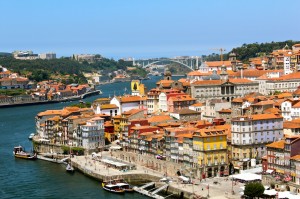Language Door has provided classes in dozens of languages to students from all over the West Hills area. Our focus is on small group classes to maximize the interaction between students and teachers. We also offer private lessons, translations, interpreting services, and corporate classes.
Interesting Facts About the Portuguese Language
- It serves as the official language of nine countries and is spoken in at least thirty-four countries.
- Portuguese is the fourth most learned language in the world.
- The Ironbound section of Newark, New Jersey is known as “Little Portugal,” and they celebrate Portugal Day with a festival every year near June 10.
- Portuguese and Brazilians are known for being extremely fun, friendly and kind people.
 Where Is Portuguese Spoken?
Where Is Portuguese Spoken?
Today, as many as 210 million people throughout the world speak Portuguese as their native language. Portuguese is the seventh most spoken language in the world (third most spoken western European language after English and Spanish) and is the official language of seven countries:
Angola(10.3 million), Brazil(192 million), Cabo Verde(346,000), Guinea-Bissau(1 million), Mozambique(15.3 million), Portugal(10.1 million), São Tomé and the Príncipe Islands (126,000), Macao, Goa, East Timor as well as 687,126 speakers in the United States who can be found in communities across the nation.
In 1986, Portuguese became one of the official languages of the European Union (EU) when Portugal was admitted to the organization.
Learn to Speak Portuguese with Language Door Today!
Language Door’s expert teachers offer instruction for students of all ages. We keep our tuition prices low but offer quality instruction in a pleasant environment. We keep the class size small to maximize the interaction between students and teachers. Our teachers are native speakers and offer the hands on training that will enhance your learning experience.

[xyz-ihs snippet=”languages”]
About the Portuguese Language
Portuguese is one of the major languages of the world, the sixth most spoken language worldwide, spoken by about 200 million people on four continents. It belongs to a group of languages called “Romance” or “Neo-Latin” that evolved from Latin, the language of Latium in Ancient Italy, or more specifically, the city of Rome.
After the Roman invasion, Latin gradually became established in the Iberian peninsula and finally replaced the native languages. When the country of Portugal was founded, it adopted its own particular Romance, which was essentially Portuguese, as the national language.
Because there are some similarities between Spanish and Portuguese–and both are a product of the Iberian peninsula–many erroneously believe that Portuguese is merely a dialect of Spanish. Nothing could be farther from the truth.
History Of Portuguese Language
Portuguese developed in the western part of the Iberian Peninsula (now Portugal and the Galicia region). Portuguese is a descendent of Latin, which was brought to the Iberian Peninsula by Roman soldiers, settlers and merchants from 218 BC. In the fifth century, the language began to differentiate itself from other Romance languages after the fall of the Roman Empire and the Barbarian invasions. Around the ninth century, it was being used in written documents, and it was a variant between Vulgar Latin and modern Romance languages (Portuguese, Castilian, French, etc.). By the fifteenth century, Portuguese had become a language with a rich body of literature of its own.
